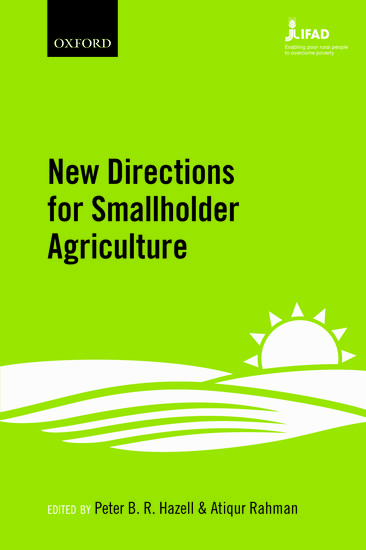By Peter Hazell and Atiqur Rahman
The case for smallholder development as a win-win strategy for achieving agricultural growth, poverty reduction, and food insecurity is less clear than it was during the green revolution era. The gathering forces of rapid urbanization, a reverse farm size transition towards ever smaller and more diversified farms, and an emerging corporate-driven business agenda in response to higher agricultural and energy prices, is creating a situation where policy makers need to differentiate more sharply between the needs of different types of small farms, and between growth, poverty, and food security goals.
Many smallholdings today are too small to provide adequate livelihoods, and their farm families have either begun a transition out of farming into the nonfarm economy, or they are trapped in subsistence modes of farming. Both kinds of smallholders may need assistance developing new off-farm opportunities, and in overcoming poverty and food insecurity. These smallholders account for large shares of the total rural poor and food insecure people in the developing world, and they are an important target group for international efforts to achieve the MDGs and promote food security. However, transition and subsistence oriented farms play a relatively minor role in producing marketed surpluses to drive economic growth and feed growing urban populations, and are unlikely to successfully link to modern value chains. Interventions to improve on-farm productivity can be helpful to the food security of both groups, but will need to be complemented by other interventions that more directly alleviate poverty and facilitate off-farm transitions.
In contrast, there are also many small farmers who, because of their resource endowments, good location or shear entrepreneurial skill, are succeeding as commercial farm businesses, even if only on a part time basis. These kinds of small farms are much more aligned with the new corporate driven business agenda. As with small farms in green revolution days, they can play important roles in driving economic growth and feeding urban populations. The greatest challenge facing these types of smallholders is accessing modern value chains. Private sector investments along value chains are opening up new market opportunities for some smallholder farms, particularly for high value products, but it is also becoming apparent that many more commercially oriented smallholders are being left behind while larger farms are gaining market shares.
If more smallholder farms are to become commercially successful in farming, policy makers will need to do more to support them. Key areas for support include improving the workings of markets for outputs, inputs, land and financial services to overcome market failures that discriminate against small farms, investing in the kinds of R&D and rural infrastructure that small farmers need, helping to organize small farmers for the market, and incentivizing the private sector to link with more small farmers. The best way to achieve these is for government to work through private sector and civil society partners, creating an enabling policy and business environment, and scaling up proven successes.
An important challenge is the development of practical ways of identifying different groups of small farms on the ground. There has been a lot of recent work using spatial analysis methods to identify target areas for rural development purposes. Most of this work focuses on mapping different regions in terms of their agro-ecology, market access, and rural population density, but so far there has been limited work on disaggregating further according to differences in farmer endowments, market orientation and gender.
Peter Hazell was formerly director of the development strategy and governance division at the International Food Policy Research Institute (IFPRI) in Washington DC, and a visiting professor at Imperial College London. Atiqur Rahman was formerly a member of the Strategy and Knowledge Management Team of the International Fund for Agricultural Development (IFAD) in Rome. They have edited New Directions for Smallholder Agriculture.
Subscribe to the OUPblog via email or RSS.
Subscribe to only business and economics articles on the OUPblog via email or RSS.
Image credit: Women smallholder farmers in Kenya. By McKay Savage [CC-BY-2.0], via Wikimedia Commons




Recent Comments
There are currently no comments.